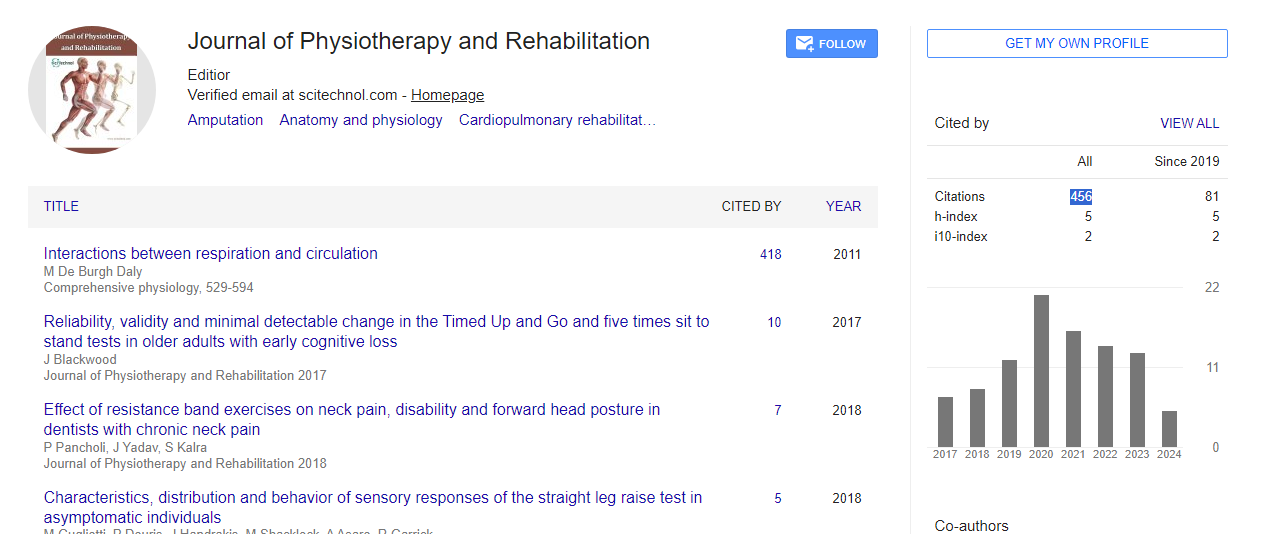Perspective, J Physiother Rehabi Vol: 8 Issue: 4
Kinesiology in Aging Populations: Enhancing Mobility, Balance and Functional Independence in Older Adults
Moce Dau*
1Department of Kinesiology, Northern Illinois University, DeKalb, IL, USA
*Corresponding Author: Moce Dau,
Department of Kinesiology, Northern Illinois
University, DeKalb, IL, USA
E-mail: daumoc@e.edu
Received date: 23 July, 2024, Manuscript No. JPTR-24-147319
Editor assigned date: 25 July, 2024, PreQC No. JPTR-24-147319 (PQ);
Reviewed date: 08 August, 2024, QC No. JPTR-24-147319
Revised date: 15 August, 2024, Manuscript No. JPTR-24-147319 (R);
Published date: 22 August 2024, DOI: 10.4172/JPTR.1000175.
Citation: Dau M (2024) Kinesiology in Aging Populations: Enhancing Mobility Balance and Functional Independence in Older Adults. J Physiother Rehabi 8:4.
Description
Kinesiology is the scientific study of human movement plays a important role in enhancing the mobility, balance and functional independence of aging populations. By applying principles of biomechanics, physiology and motor control kinesiology offers valuable insights and interventions that can significantly improve the quality of life for older adults. Mobility refers to the ability to move freely and safely which is essential for performing daily activities and maintaining independence. In older adults mobility challenges can arise from age related changes such as reduced muscle strength, joint stiffness and decreased flexibility. These issues can impact the ability to walk, climb stairs and navigate different environments, increasing the risk of falls and injuries.
Balance is critical for preventing falls and ensuring stability during movement. Age-related changes in sensory perception, proprioception and neuromuscular function can compromise balance. Impaired balance increases the likelihood of falls, which can lead to serious injuries and a decline in overall health and independence. Functional independence encompasses the ability to perform Activities of Daily Living (ADLs) such as bathing, dressing, cooking and managing personal finances. Maintaining functional independence is important for overall well-being and quality of life. As physical abilities decline with age, older adults may require support to complete these tasks which can impact their autonomy and self-esteem.
Regular physical activity is fundamental for maintaining and improving mobility, balance and functional independence. Kinesiologists design exercise programs fitted to the needs of older adults, focusing on strength training, flexibility, balance and aerobic conditioning. Strength training exercises such as resistance bands help resist muscle loss and improve functional capacity. Flexibility exercises like stretching or yoga enhance joint range of motion and reduce stiffness. Balance training exercises such as standing on one leg or using balance boards improve stability and prevent falls. Aerobic exercises including walking or swimming, support cardiovascular health and overall ability. Kinesiologists implement specific balance training programs to address age-related balance deficits. These programs often include exercises that challenge stability, such as walking heel-to-toe. Additionally, environmental modifications and fall prevention strategies, such as installing grab bars and removing tripping hazards, are recommended to create a safer living environment.
Functional training focuses on enhancing the ability to perform ADLs by simulating real-life activities in a controlled setting. Kinesiologists work with older adults to improve skills such as getting in and out of chairs, climbing stairs and carrying objects. By practicing these tasks, individuals can develop better coordination and strength, leading to greater independence in daily life. Kinesiologybased interventions contribute to improved mobility and functional independence by addressing physical impairments and promoting strength, flexibility and balance. As a result, older adults can perform daily activities with greater ease and confidence, leading to increased autonomy and improved quality of life.
Conclusion
Kinesiology offers valuable tools and strategies for enhancing mobility, balance, and functional independence in aging populations. Through targeted exercise programs, balance training, functional training and posture correction. Kinesiologists can support older adults in maintaining their physical abilities and improving their quality of life. As the aging population continues to grow, the role of kinesiology in promoting healthy aging and addressing the physical challenges associated with aging will become increasingly important.
 Spanish
Spanish  Chinese
Chinese  Russian
Russian  German
German  French
French  Japanese
Japanese  Portuguese
Portuguese  Hindi
Hindi 